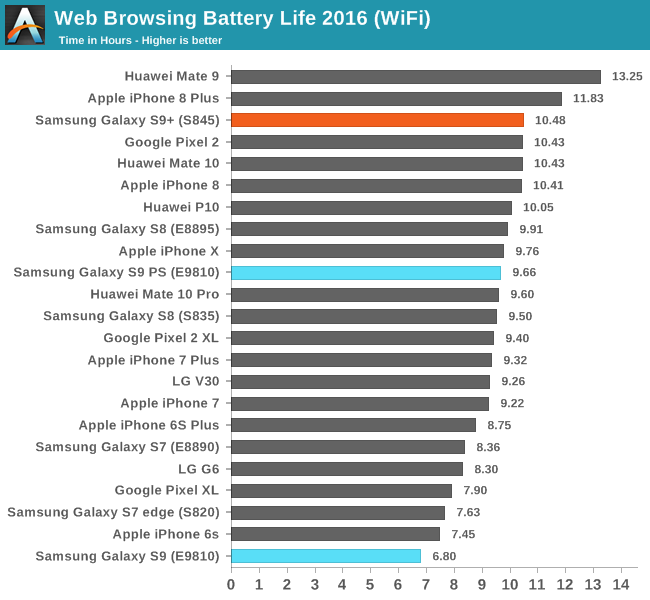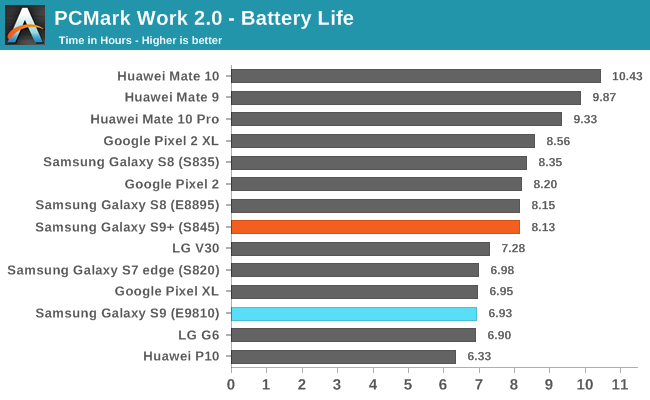The Samsung Galaxy S9 and S9+ Review: Exynos and Snapdragon at 960fps
by Andrei Frumusanu on March 26, 2018 10:00 AM ESTBattery Life - A Stark Contrast
We extensively covered the performance of the Snapdragon and Exynos Galaxy S9’s – what remains to be seen is how that performance affects battery life in our standard tests. Performance between the regular and larger Galaxy S9 doesn’t change, however battery life may differ based on the variant as the regular S9 sports a 3000mAh (11.55Wh) battery versus the 16% higher 3500mAh (13.47Wh) of the Galaxy S9+. Naturally the 14.2% bigger screen area of the S9+ offsets some of that advantage.
Unfortunately for this review we couldn’t get identical variants of the different SoC Galaxy S9s – our S9+ is a Snapdragon 845 unit while our S9 is an Exynos 9810 unit, so we weren’t able to execute a true apples-to-apples comparisons between the SoC variant, however as we’ll see the delta between the units is large enough that it won’t change the conclusion.
Our web browsing test tries to mimic real-world usage patterns of browsing websites. This includes iterating through a list of websites and scrolling through them. In this test, screen efficiency and battery size play a role, but also we balanced it so that it also sufficiently stresses the SoC (CPU, GPU and display pipeline) as well.

The Snapdragon 845 Galaxy S9+ posted excellent battery life in our test and lands only third to the iPhone 8 Plus and the Mate 9. Unfortunately we never tested the S8+ to see the generational difference, but it shouldn’t be too different from the S835 regular S8 at around the 10 hour mark.
The Exynos 9810 Galaxy S9 absolutely fell flat on its face in this test and posted the worst results among our tracking of the latest generation devices, lasting 3 hours less than the Exynos 8895 Galaxy S8. This was such a terrible run that I redid the test and still resulted in the same runtime.
I investigated the matter further to try to see if this was caused by the high energy usage of the M3 cores – and it seems it is. Enabling the “CPU limiter” (S9 PS result in the graphs) which is found in the battery optimisation options of Samsung’s firmware greatly throttles the M3 cores down to 1469 MHz, memory controller to half speed and also seemingly changes some scheduler settings to make them more conservative. This results in peak performance equal to the Exynos 8895- however the scheduler alterations also noticeably slow down UI responsiveness so it’s actually a worse experience. Nevertheless, backing off on performance results in regaining almost 3 hours.
This is such a terrible battery performance of the Exynos 9810 variant that it again puts even more clout into the new SoC. My theory as to why this happens is that not only do the higher frequency state require more energy per work done than competing SoCs – because this is a big CPU complex there’s also lots of leakage at play. The DVFS system being so slow might actually be bad for energy here as we might be seeing the opposite of race-to-sleep, walk-to-waste. The fact that Apple’s SoCs don’t have any issues with battery life in this test showcases that it’s not an inherent problem of having a high-power micro-architecture, but rather something specific to the Exynos 9810.

In PCMark the disadvantage of the Exynos 9810 S9 isn’t as pronounced as in the web test, however it’s again a regression to the Exynos 8895 S8 – all while not posting a meaningful performance advantage over its predecessor that might explain the lower battery life.
The Snapdragon 845 Galaxy S9+ fared relatively well, even though it’s not quite as good as other devices.
In my personal every-day usage I can’t saw that I noticed a massive disadvantage in battery life on the Galaxy S9, however my everyday usage is relatively light and I haven’t had enough time with the phone yet as a daily driver to make a final judgment. I did notice that the Exynos 9810 does shows signs of suffering in heavy tasks. Instances of Gmail syncing my inbox with a new account did once result in a warm phone while the Snapdragon 845 Galaxy S9 did not showcase this characteristic.
I can’t fault the Snapdragon S9+ in the time I had it, but again I haven’t had enough real time with it to really judge it subjectively. As far as AnandTech testing goes, the data speaks for itself and based on what I’ve seen I strongly do not recommend the Exynos variant of the Galaxy S9 in its current state, especially if you’re a regular user of heavy apps.
Over the coming weeks I’m planning to try to dive into the workings of the Exynos 9810 and post a follow-up article on whether it’s possible to improve both in terms of performance as well as battery life if one changes the way the SoC’s scheduler and DVFS works. In the eventuality that Samsung updates its firmware to resolve these large issues with the Exynos Galaxies, then we’ll revisit the matter as soon as possible.










190 Comments
View All Comments
djayjp - Monday, March 26, 2018 - link
NAND performance?djayjp - Monday, March 26, 2018 - link
nvm. Hope to see that update!Lau_Tech - Monday, March 26, 2018 - link
An interesting read with an objective treatment of the s9 pros and cons ! Thank you very much Andrei!Diggamata - Tuesday, March 27, 2018 - link
Thanks for the highly insightful and detailed analysis of the SoCs, AnandTech never dissapoints!Looks like mobile SoCs aren't really limited by area anymore especially with screens getting bigger, they got more room to flex. But what in the hell does it take ARM 24.53mm2 only to be slower in peak performance than Qualcomm's 11.69mm2? It might be how their SIMDs are only 4-wide compared to the traditional 32 (Nvidia) or 64 (AMD and Qualcomm) which requires a lot more control logic. Although ARM's architecture seems not that far behind in efficiency just more conservative in their clocks so they could actually go to 5w and match upto Qualcomm's peak performance in GFXBench 3.1 offscreen.
Would be nice to get some more info on the sustained performance metric. A graph-plot of FPS over time would've been the best way to show this in action. I feel the sustained performance is more of a DVFS characteristic than SoC efficiency so it would be nice to see how they adjust clock-frequencies relative to load and thermals.
jjj - Tuesday, March 27, 2018 - link
How is power at idle and/or A55 load for Exynos vs SD845? The gap in battery life is likely way too large to be only about the big cores, unless the testing methodology is flawed in a big way.Steveh20 - Tuesday, March 27, 2018 - link
I just read an article about how the price of the iPhone may have been to much for some, I read the whole article and there was not 1 mention of Samsung, I said to myself.. " they can do an iPhone article with out mentioning Samsung but they can't do a Samsung article with out mentioning Apple" sure enough this was the next article I clicked on and boom.. in the first paragraph there is a apple mention.. I stopped reading after I saw the word apple..jospoortvliet - Tuesday, March 27, 2018 - link
Any iPhone X review would mention Samsung I am sure if only because they manufacture the screen... but a pure price arti ce can easily talk about Android in general. Anyway you missed the best galaxy S9 review on the web.N Zaljov - Tuesday, March 27, 2018 - link
Although I can somehow relate to your point of view, ignoring Apple in an article that is mainly focused on actual user experience and real life orientated workloads would be the dickmove #1 due to the fact that - even after all these years - Apple still generally makes devices that are among the best when it comes to real life use cases and responsiveness.Devices like the Pixel phones with their heavily tuned EAS scheduler and optimized components (both hard- and software) are actually pretty much equal to Apple‘s counterparts, but their marketshare is...well...kind of underwhelming IMHO. The fact that Google can optimize their devices without any control over the „main“ silicon, whereas Samsung totally sucks in this regard, even though they could do a full stack optimization, is really interesting, but staggering at the same time.
In any case: You should seriously consider reading the article, it‘s pretty much the best out there.
name99 - Tuesday, March 27, 2018 - link
Uh, dude, did you even fscking look at a relevant article?The iPhone 7 review is here:
https://www.anandtech.com/show/10685/the-iphone-7-...
Let's see.
Pg1 says Samsung is Apple's biggest competitor.
Pg2 talks about Samsung's screens
Pg3 has Samsung devices in the benchmark tables
Likewise for battery life.
Likewise for camera performance.
Seriously, what more do you expect?
NeatOman - Tuesday, March 27, 2018 - link
Really interesting looking at the 845 benchmarks, now I just need to wait for a phone i like to have the same chipset ;-PLooking at you Pixel 3.. maybe One+ 6 if it has a full RGB OLED (2160x1080).